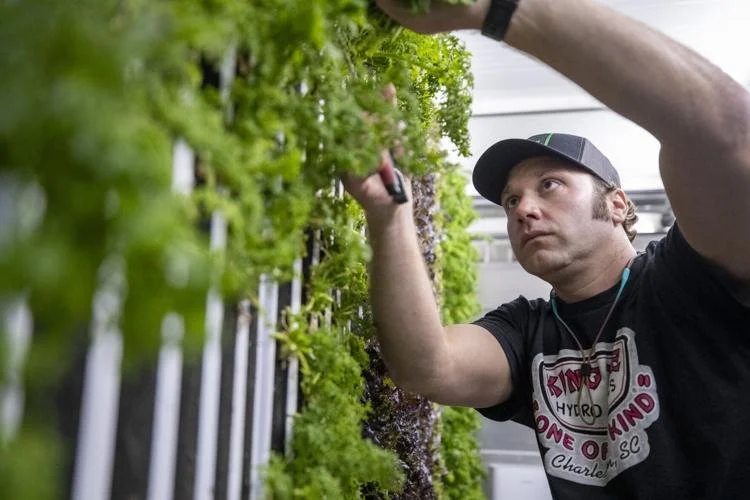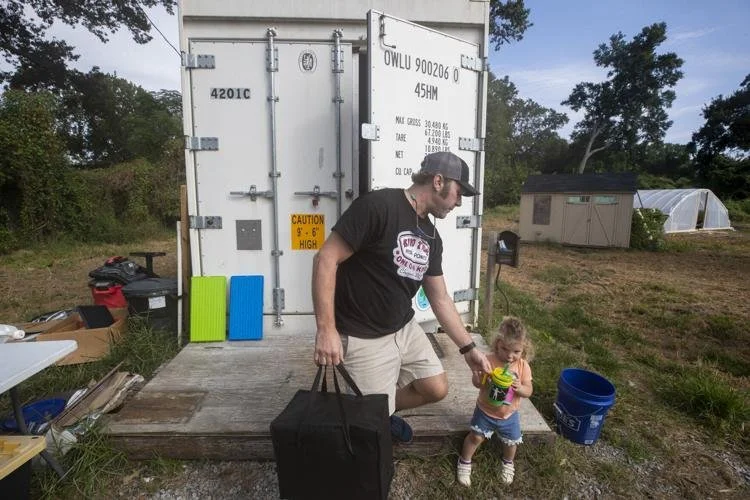Farm to Table: Charleston-Area Growers and Chefs Form Dream Team Allowing Small Operations To Expand
Ray Healy comes from a family of farmers, but it was a career in engineering that brought the Seattle native cross-country to the Charleston area.
His time as an executive on Boeing’s leadership team allowed him to get acclimated to the Lowcountry’s restaurants. A few years later, he's playing a pivotal role in what’s on the menu at one of the top destinations in Summerville.
That wasn’t Healy’s intention when he and his wife purchased land in Dorchester County two years before his retirement. He wanted a place for their horses and five dogs — one yellow lab, a Chihuahua and three Great Pyrenees — to roam. A serene setting where he could slow down.
Instead, Healy’s life has sped up since he launched Yellow Dog Farm, named after their lab Penny. He wouldn’t have it any other way.
It started as a humble garden with produce the Healys would sell at a local farmers market and post about on Facebook. Then, the sous chef at Jeremy Holst’s Bexley Fish & Raw Bar reached out with an idea.
Would Healy be interested in growing vegetables for the Summerville restaurant? His answer was a resounding “yes.”
From Cherokee Purple tomatoes to yellow corn shoots, bok choy and frill mustard, Healy has delivered all sorts of rare produce grown specifically for Holst since.
Their partnership demonstrates how local farmers are filling a particular need for chefs in the Charleston-area restaurant industry. And Healy isn’t the only grower farming specifically for restaurants.
Staying nimble
Growing quality produce isn’t enough — you have to sell it, too.
Hamilton Horne was the one approaching restaurants when he launched King Tide Farms, which produces leafy greens with names like red streak arugula, fern parsley and bronze fennel — some of which Horne conjures up himself.
His pitch differed from other local farmers: the Sullivan’s Island native promised to deliver what he dubbed the “chef’s cut,” a smaller-sized green that could go directly from his farm to the plate.
A handful of Charleston chefs, including Dano Heinze of Vern’s, realized these weren’t typical garnish greens and became customers immediately. They valued Horne’s chef’s cuts and microgreens for their aesthetics and the strong flavor profile they provided.
“I’m cutting it that day and delivering it to them,” Horne said.
Hamilton Horne cuts greens at King Tide Farms, Thursday, September 19, 2024, in North Charleston. The plants cultivated in this shipping container Horne refers to as a "chef's cut", meaning they have smaller leaves and are easier to plate.
Laura Bilson/Staff
There was some pushback on his pricing at first, Horne said. Chefs soon realized that the quality of King Tides Farms’ greens meant wasting less and ultimately saving more money.
“I’m looking for a more manageable product that these chefs can use that really ties and brings that whole dish together,” Horne said. “I want to make sure that these things have a purpose.”
Did we mention Horne’s farm is located inside a shipping container that parks outside a distillery?
Inside the tight, dim receptacle next to Firefly Distillery in North Charleston, crops grow fast using less water than the farm generates. He controls the entire operation from his phone or computer. A shorter growing cycle — about four to five weeks — means Horne can move quickly alongside his restaurant partners.
“It allows me to really grow a wide range of things,” said Horne, whose crops receive 18 hours of red and blue “sunlight” every day. “That’s where we’re really able to push how much the plant can grow.”
Red and blue lights are demonstrated by the staff at King Tide Farms, Thursday, September 19, 2024, in North Charleston. These lights facilitate growth of roots and leaves and are turned on from 2 p.m. to 8 p.m. daily. "An average day in here, we’ve got it on steroids," said Hamilton Horne, claiming that every day of growth under their system equals three days of growth outside. Laura Bilson/Staff
Slide show captions:
Hamilton Horne cuts greens at King Tide Farms, Thursday, September 19, 2024, in North Charleston. Laura Bilson/Staff
Tangerine Marigolds grow in the nursery at King Tide Farms, Thursday, September 19, 2024, in North Charleston. Both the flower and the leaves, known as tangerine lace, are sold to chefs. King Tide Farms offers a variety rare and highly specialized greens and edible flowers. "It’s like Willy Wonka in here," said Hamilton Horne. Laura Bilson/Staff
Microgreens grow in the nursery at King Tide Farms, Thursday, September 19, 2024, in North Charleston. Laura Bilson/Staff
Hamilton Horne carries packaged greens to his car at King Tide Farms, Thursday, September 19, 2024, in North Charleston. Laura Bilson/Staff








